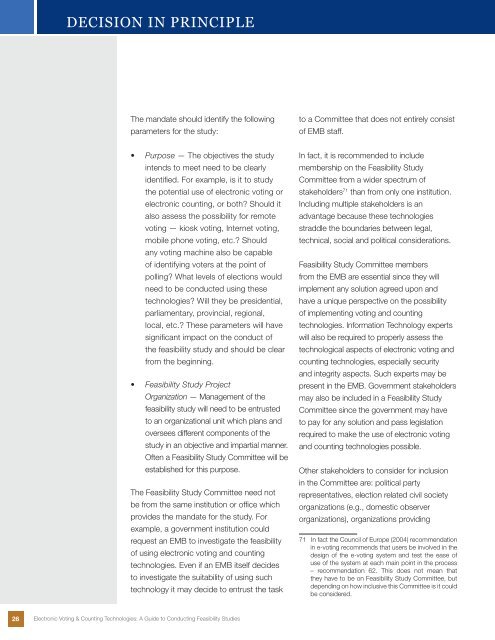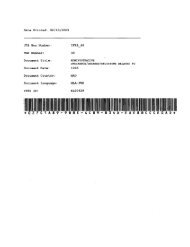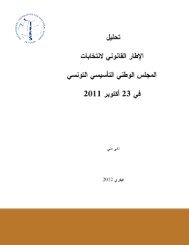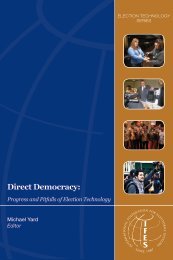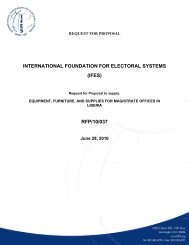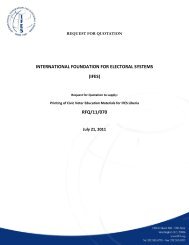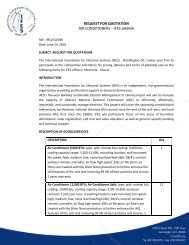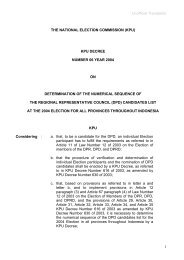Electronic Voting & Counting Technologies - IFES
Electronic Voting & Counting Technologies - IFES
Electronic Voting & Counting Technologies - IFES
- No tags were found...
You also want an ePaper? Increase the reach of your titles
YUMPU automatically turns print PDFs into web optimized ePapers that Google loves.
INTERNATIONAL DECISION PRINCIPLEELECTORAL STANDARDSThe mandate should identify the followingparameters for the study:to a Committee that does not entirely consistof EMB staff.• Purpose — The objectives the studyintends to meet need to be clearlyidentified. For example, is it to studythe potential use of electronic voting orelectronic counting, or both? Should italso assess the possibility for remotevoting — kiosk voting, Internet voting,mobile phone voting, etc.? Shouldany voting machine also be capableof identifying voters at the point ofpolling? What levels of elections wouldneed to be conducted using thesetechnologies? Will they be presidential,parliamentary, provincial, regional,local, etc.? These parameters will havesignificant impact on the conduct ofthe feasibility study and should be clearfrom the beginning.• Feasibility Study ProjectOrganization — Management of thefeasibility study will need to be entrustedto an organizational unit which plans andoversees different components of thestudy in an objective and impartial manner.Often a Feasibility Study Committee will beestablished for this purpose.The Feasibility Study Committee need notbe from the same institution or office whichprovides the mandate for the study. Forexample, a government institution couldrequest an EMB to investigate the feasibilityof using electronic voting and countingtechnologies. Even if an EMB itself decidesto investigate the suitability of using suchtechnology it may decide to entrust the taskIn fact, it is recommended to includemembership on the Feasibility StudyCommittee from a wider spectrum ofstakeholders 71 than from only one institution.Including multiple stakeholders is anadvantage because these technologiesstraddle the boundaries between legal,technical, social and political considerations.Feasibility Study Committee membersfrom the EMB are essential since they willimplement any solution agreed upon andhave a unique perspective on the possibilityof implementing voting and countingtechnologies. Information Technology expertswill also be required to properly assess thetechnological aspects of electronic voting andcounting technologies, especially securityand integrity aspects. Such experts may bepresent in the EMB. Government stakeholdersmay also be included in a Feasibility StudyCommittee since the government may haveto pay for any solution and pass legislationrequired to make the use of electronic votingand counting technologies possible.Other stakeholders to consider for inclusionin the Committee are: political partyrepresentatives, election related civil societyorganizations (e.g., domestic observerorganizations), organizations providing71 In fact the Council of Europe (2004) recommendationin e-voting recommends that users be involved in thedesign of the e-voting system and test the ease ofuse of the system at each main point in the process– recommendation 62. This does not mean thatthey have to be on Feasibility Study Committee, butdepending on how inclusive this Committee is it couldbe considered.26<strong>Electronic</strong> <strong>Voting</strong> & <strong>Counting</strong> <strong>Technologies</strong>: A Guide to Conducting Feasibility Studies


